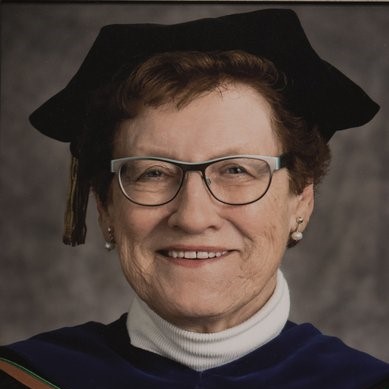Five Things I’ve Learned About Doing the Right Thing
Stephanie Bailey - 21 December 2022

Photo: Supplied.
In 1960, at the age of 19, Janet Storch, ’62 Dip(Nu), ’63 BScN, ’77 MHSA, ’87 PhD, found herself feeling uncomfortable in an operating room. It wasn’t squeamishness. As a University of Alberta student nurse, she was prepared for the visceral realities. What surprised her was the behaviour of the surgeons, who started throwing around profanities and insults as soon as the patient had gone under.
When she talked to a senior nurse about her concerns, she heard: “Unfortunately, nurses can’t do much about it.”
That’s when Storch decided to devote the rest of her career to proving otherwise.
As a clinician, researcher and educator, Storch has been advancing the field of applied ethics in health care ever since. She helped revise the Canadian code of ethics for nurses more than once, and she also wrote the book — literally — on patients’ rights, back in 1982. Now retired, she shares a few takeaways from a career devoted to doing the right thing.
- Question the Status Quo
“Ethics is an invitation to question long-standing practices,” says Storch. It’s the practice of asking hard questions to make the right decisions in the real world. In health care, Storch adds, practitioners need to ensure the questions they’re asking prioritize the interests of the patient. Are they comfortable and safe? Are they informed and empowered? “It’s important to keep a questioning mind that’s person-centred and connected to caring. It isn’t just an academic exercise.”
- Don’t Be Afraid to Speak Up
Early in her career, Storch remembers interviewing U of A surgeon John Dossetor as part of a research project about ethics in health care. During the interview, Storch says, Dossetor recalled witnessing “army methods” of research that involved medical researchers simply ordering the recruits to get in line. The end of her interview with Dossetor ended up being the beginning of a rewarding professional relationship between the two, with Storch playing an integral role in establishing what would become known as the John Dossetor Health Ethics Centre at the U of A.
She learned a valuable lesson, she says: “Never be afraid to speak up about what you believe is right. Even if you’re wrong, you learn that. Worst-case scenario, you have a conversation that helps both of you better understand an issue.”
- Play Your Part
“Ethics isn’t just someone else’s business,” says Storch. When she started nursing, “the average nurse was still afraid to speak up to something that wasn’t going well on the ward or just believed that it wasn’t their problem.” Times have changed, but Storch believes we can go further to entrench ethical thinking into the everyday. “As people find out how helpful it is to learn more about ethics to satisfy their need to feel comfortable about what they’re doing, then I think the excitement grows about what ethics can mean, how it can help and what it can do.”
- Take a Load Off
Ethical thinking is the best remedy for a nagging doubt, says Storch. “As people come to see the difference between what they’re doing and what they should be doing, it’s astonishing how relieved they can feel.” Weighing the ethical considerations of a decision empowers nurses to move forward with confidence. While Storch admits that ethical decision-making may be a headache in the short term, there is comfort in knowing you’ve covered your bases and can articulate your reasoning to patients, colleagues and supervisors.
- Invest the Time
Storch understands that ethics protocols can add to overburdened workloads and lengthy research procedures. (Gone are the days of just lining up soldiers!) But it’s worth it. Take, for instance, the protocol of obtaining informed consent from patients, which elevates them from subjects to active participants in research and their own health care. This protocol also adds value to research because it forces researchers to carefully think through their plan, why it matters and how it affects the patient. “Ethics is important inside and outside health care because it asks us to question why we’re doing something and make the case for why it’s important.”